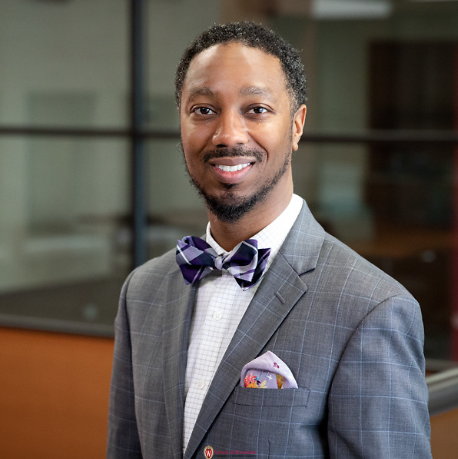New UW–Madison Study Reveals Keys to Graduate Student Wellness, Belonging, Persistence
August 25, 2025 | By WCER Communications

WCER Faculty Researcher Brian Burt studied the unique challenges underrepresented students face adjusting to graduate school.
A new study from the University of Wisconsin–Madison sheds light on the unique challenges Black men face when adjusting to graduate engineering programs—and offers actionable insights for improving program persistence and support for underrepresented students.
Published in the journal Policy Insights from the Behavioral and Brain Sciences, the research highlights the importance of sociocultural adjustment in achieving success in graduate school, even more so than academic preparation. The study also draws lessons from Black men’s experiences and offers recommendations on how these lessons can be applied to a broader audience of graduate students.
The research, conducted in the lab of Principal Investigator Brian Burt at the Wisconsin Center for Education Research (WCER), suggests that focusing solely on academic and professional socialization is a mistake.
“Students navigate new political, racial, economic and cultural landscapes when entering graduate school,” said Burt, a professor in the Department of Educational Leadership and Policy Analysis in the UW–Madison School of Education. “Focusing solely on academics misses the broader picture of what these students need to thrive.”
Burt, who also directs Wisconsin’s Equity and Inclusion Laboratory (Wei LAB) at WCER, led a team that conducted in-depth interviews with Black male engineering graduate students across the country. The research found that these students often face racial isolation, cultural dissonance, and structural barriers, factors that can lead to confusing peer interactions, mixed advisor relationships, and hostile lab experiences.

Mark Moralez
“This research gave voice to experiences that are often overlooked,” said Mark Moralez, a co-author on the paper and doctoral student in the School of Education. Yuriko Sato, another co-author and School of Education doctoral student said: “It’s not just about surviving grad school; it’s about being seen, supported and empowered to succeed while staying true to who you are.”
According to the American Society for Engineering Education, Black men across the United States earned only 1.42% of the engineering master’s and doctoral degrees awarded in 2023, excluding foreign nationals.
The researchers advocate for institutional policies that go beyond academic support to foster identity affirmation, wellness and equity. Breaking down the students’ responses about the adjustments they’ve made to be successful in graduate school led to six key recommendations, which researchers said can be applied more broadly:
- Graduate success is not just academic: Sociocultural adjustment is essential to the persistence and well-being of underrepresented graduate students.
- Support interest groups that affirm racial, cultural and gender identities to reduce isolation and foster belonging.
- Institutions should acknowledge that foreign-born, international and ethnically diverse students face distinct sociocultural challenges.
- Culturally affirming transition materials (e.g., “Green Book”) should list relevant community resources.
- Easing transitions especially matters for students entering predominantly and historically white institutions.
- Research needs to show how sociocultural adjustments shape graduate students’ overall progress through graduate education.
In the study, the term “adjustment,” rather than “assimilation,” is used to mean a process of maintaining cultural and ethnic foundations while transitioning to new environments—or what the article called “balancing one’s core identity with new institutional norms and vales,” and “students’ intricate negotiations to maintain cultural identities while navigating new environmental expectations.”

Yuriko Sato
The study was led by Burt and co-authored with two School of Education doctoral students, Yuriko Sato and Mark Moralez, and three recent graduates: Drs. Tiaira Porter-Beall, Joshua Wallace, and Blayne Stone Jr.
Read the full journal article for detailed findings and implications for institutional policy, professional practice and future research.
About Wisconsin’s Equity and Inclusion Laboratory (Wei LAB)
Established in 2010, Wei LAB is an international leader in research conceptually rooted in frameworks of equity and inclusion, focused on pathways to and experiences in the workforce. Wei LAB’s work included projects that examine topics such as African American success, LGBTQIA+ climate, STEM, and educational opportunities for minoritized students. Through original research, surveys, and interviews, we gather data on diversity and inclusion and provide recommendations to improve institutional practices.
About the Wisconsin Center for Education Research
The Wisconsin Center for Education Research at UW–Madison’s #1 ranked public School of Education is one of the first and most productive education research centers in the world. It has assisted scholars and practitioners in developing, submitting, conducting and sharing grant-funded education research for over 60 years.


